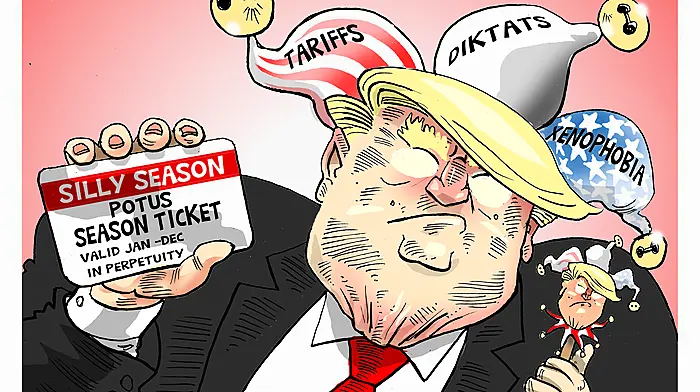IRISH ministers this week welcomed the approval of the Nature Restoration Law in the EU Environment Council.
Minister of State (with responsibility for Nature) Malcolm Noonan TD was first out of the traps to lend his support to the move.
He was quickly followed by Minister for the Environment and Climate, Eamon Ryan TD, who also welcomed the vote – a day before he announced his intention to leave politics. He was quickly followed by Minister Catherine Martin who said she was leaving the role of deputy leader of the Green Party.
Therein lies a very sorry tale.
One of the biggest challenges for our government – and governments all over Europe – in the months and years to come, will be walking that very fragile tightrope between saving the planet and keeping vested interests onside while they do so.
Eamon Ryan cited many reasons for his decision to step down, but the general collapse of the Green vote, not just in Ireland, but right across Europe, is bound to have been a very significant factor.
The poor showing for Green parties in the recent European Parliament elections, at a time when their message has never been more important, was summed up by the New York Times headline: ‘The Greens Are Dead. Long Live the Greens!’
It is a dilemma that is going to test the most agile of minds for some time – how to incentivise farmers around the world to completely change their methods in the short-term, and possibly lose their livelihoods in many cases, in order to secure a long-term gain – to reduce the effects of climate change.
The newly-agreed Nature Restoration Law, according to the Irish government’s response this week, ‘provides an opportunity to reverse biodiversity loss and restore nature.’
The final text had been previously approved by the European Parliament in Luxembourg in February and was this week adopted by qualified majority vote in the Council of Environment Ministers of the 27 member states.
Minister Malcolm Noonan stressed the importance of the plan in very stark language: ‘The future of human civilisation depends entirely on healthy, functioning ecosystems, but these life support systems are declining dangerously. We are in a biodiversity emergency.’ He added: ‘The Government has supported the Nature Restoration Law at every step, as has the Dáil – members voted 121 to 9 in favour of nature restoration last year.’
It is, odd, then, that the government still continues to work against itself on so many fronts. One prime example would be the continuing recommendation by the State agricultural advisory board to farmers to use glyphosate in tillage farming. Glyphosate is the highly controversial weed killer that has been classified by the World Health Organisation as ‘a probable human carcinogen.’
When it was approved by Europe for use for another decade, last November, Green MEP Grace O’Sullivan was very annoyed. ‘The entire Commission case for renewing this harmful chemical is a report that found “no critical area of concern” for renewing glyphosate,’ she said, adding that the same report found a ‘high long-term risk to mammals’ in a majority of cases. ‘It also failed to take any biodiversity considerations into mind, at a time of collapsing pollinator populations,’ she said. O’Sullivan lost her seat in Ireland South last week.
It is hard to understand any legislating body which refuses to ban a substance suspected of harming biodiversity, on the one hand, and then supports laws to help restore biodiversity, on the other.
It serves as a microcosm of the overall difficulty in trying to keep everyone happy. ‘Europe is the fastest warming continent and is facing unprecedented impacts from the intertwined nature and climate crises. This is a decisive step towards addressing the very real risks we are already seeing, from desertification to flooding,’ said Minister Noonan this week, when welcoming the restoration law.
Yet many organs of the Irish State have been implicated in recent years in the pollution of waterways and the largescale killing of fish.
Add to that the slow uptake in the use of electric cars due to poor infrastructure, the reluctance to retro-fit homes because of the shortage of adequate grants, the insistence on allowing large data firms to cannibalise our power supplies, and the slow development of supports for wind energy … and it’s difficult to see where there urgency in saving the planet actually lies, in this country. Our environmental campaigners have an uphill battle ahead, in order to get many sectors of society on board, if not the government itself.
Is it any wonder the leader and deputy leader of the Green Party have decided to take a step back?
The summer starts here
THIS week saw the majority of Leaving and Junior Cert students finishing the gruelling exams, and the primary schools closing their doors for their two-month break.
To tie in with the feelgood factor, your local newspaper has published a massive 104-page free guide to things to see and do around this wonderful region over the holidays.
Many of the items and adventures are free themselves, and all are right here, in West Cork.
Take time to browse through it, find something to suit everyone in your household, and treat yourself to a few hours of appreciating the finer things on your doorstep – like nature, sunshine, and the bracing Atlantic.










